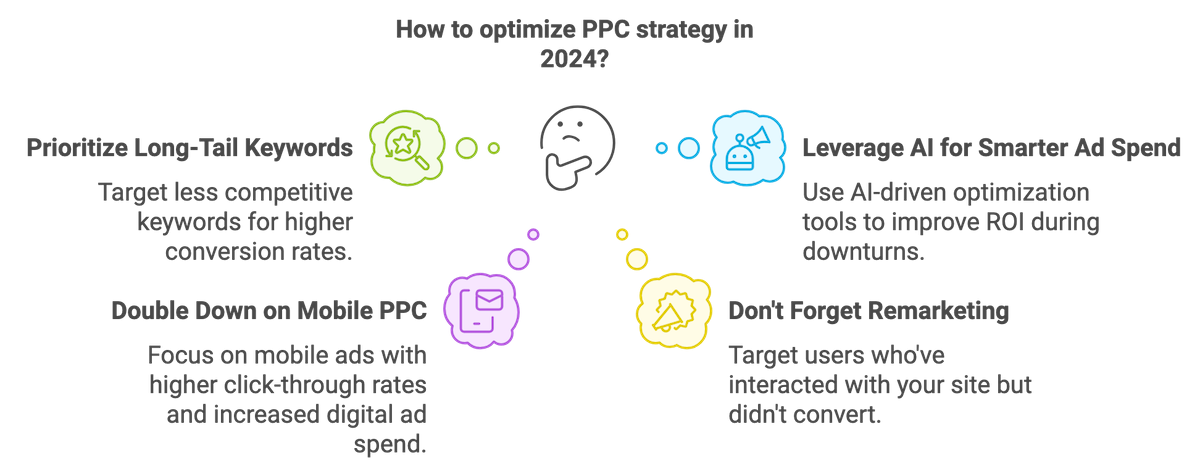How to Recession-Proof Your Marketing: Essential Tips for Uncertain Times
By: Hayden Jarman

The global economy is slowing down, and businesses everywhere are feeling the pinch.
In 2024, global growth is projected to shrink to 2.8%, with inflation stabilizing around 3-4%.
While this seems like an improvement from previous years, it’s no time for complacency. Even though consumer confidence is up, companies need to stay sharp and adapt their marketing strategies to navigate through these challenges.
Here’s the hard truth: during a recession, the businesses that thrive are the ones that lean in, not cut back.
But leaning in doesn’t mean spending blindly; it means spending smartly. Whether you run a B2B or B2C business, the game is the same—maximize return on every dollar and ensure your marketing strategies work for you, not against you.
Today, I’ll show you data-driven strategies to optimize your PPC, SEO, and content marketing to ensure your business not only survives but thrives.
So buckle up, because I’m about to show you how to recession-proof your marketing with proven, actionable insights.
📝 Is Your Marketing Strategy Recession-Ready? 💡
Answer these quick questions to see if your marketing is prepared for tough times.
Table of Contents:
- Smart Strategies for Paid Advertising in Tough Times
- Optimizing SEO for Long-Term Gains
- Cost-Effective Content Marketing That Works
- Data-Driven Marketing for Maximum ROI
- Target Recession-Resistant Sectors
- Final Thoughts
- Additional Resources
Smart Strategies for Paid Advertising in Tough Times
Paid advertising, especially PPC, can be tricky during a downturn.
Every dollar matters, and the key is to make sure your campaigns are hyper-targeted and cost-efficient.
Here’s how you do that.

1. Prioritize Long-Tail Keywords
Fact: Long-tail keywords now account for 70% of all search queries.
Why does this matter for your PPC? They’re less competitive, which means lower costs and higher conversion rates. Learn more about SEO strategy for 2024 here.
2. Leverage AI for Smarter Ad Spend
During a recession, throwing money at ads without insight is a sure way to burn through your budget.
AI-driven optimization tools have been shown to improve ROI by 25% during downturns. Platforms like Google Ads and Facebook Ads use AI to automate bidding strategies, ensuring you’re getting the best bang for your buck.
For details on how Google's algorithm changes may affect your paid campaigns, check out Google SEO updates for 2024 here.
3. Double Down on Mobile PPC
As of 2024, mobile ads account for 72% of all digital ad spend.
Plus, mobile PPC ads boast 40% higher click-through rates than desktop ads. If you’re not prioritizing mobile, you’re missing out on a massive chunk of potential revenue.
Pro Tip: Make sure your landing pages are mobile-optimized and that they load quickly. For best practices on how image size impacts loading times, read this guide on image optimization here.
4. Don't Forget Remarketing
Tough times mean longer sales cycles.
Consumers are more cautious, so the likelihood of a one-and-done sale is low. This is where remarketing becomes your secret weapon. Target users who’ve interacted with your site but didn’t convert the first time around.
PPC Strategies:
| Strategy | Why It Works | Implementation Tips |
|---|---|---|
| Long-Tail Keywords | Higher intent, lower CPC | Use keyword tools to find low-competition phrases |
| AI Optimization | Better ROI, saves time | Implement automated bidding strategies |
| Mobile PPC | 40% higher CTR | Optimize ad copy for mobile platforms |
| Remarketing | Increases conversion by 70% | Target past visitors with tailored ads |
Want to understand how to track user behavior and optimize your remarketing efforts? Dive into competitor analysis techniques here.
Optimizing SEO for Long-Term Gains
In a recession, you need a long-term game plan that doesn’t rely on constantly paying for ads.
That’s where SEO comes in—it’s a sustainable, cost-effective way to drive organic traffic and generate leads over time.
1. Embrace Voice Search
By 2024, 50% of all searches are expected to be voice-based.
If you’re not optimizing for this, you’re leaving money on the table. Voice searches are more conversational and often in the form of questions.
For an in-depth look at how rich text can support voice search, check out this guide here.
2. Prioritize Local SEO
Stat: “Near me” searches have grown by 150% year-over-year.
In tough times, consumers tend to stay local and look for businesses they trust.
If your business operates in multiple locations, it’s crucial to develop a tailored approach. Learn how to manage SEO across multiple locations effectively here.
3. Use Structured Data
Structured data helps Google better understand your content, which increases your chances of appearing in rich snippets.
These snippets can increase your click-through rates by 30%, giving you a competitive edge.
SEO Strategies:
| SEO Strategy | Why It Matters | How to Implement |
|---|---|---|
| Voice Search Optimization | 50% of searches will be voice-based | Focus on conversational, question-based keywords |
| Local SEO | 150% growth in “near me” searches | Optimize GMB profile, create localized content |
| Structured Data | Increases CTR by 30% | Use schema markup for better visibility |
One of the most overlooked elements of SEO is sitemaps. Learn why a sitemap is crucial to boosting SEO efforts here.
Cost-Effective Content Marketing That Works
Content marketing is like a Swiss army knife during a recession.
Done right, it builds authority, engages your audience, and keeps them coming back—all without breaking the bank.
1. Go Interactive
Stat: Interactive content generates 2x more conversions than static content.
People love engaging with quizzes, polls, and surveys, and these tools can give you valuable insight into your audience.
If you want to explore more creative content ideas, learn from successful campaigns such as Airbnb’s SEO tricks here.
2. Tap Into User-Generated Content
Why spend time creating content when your customers can do it for you?
User-generated content (UGC) increases engagement by 28% and builds trust, especially during uncertain times.
Content Marketing Strategies:
| Content Strategy | Why It’s Effective | Actionable Tips |
|---|---|---|
| Interactive Content | 2x more conversions | Use quizzes, surveys, or calculators |
| User-Generated Content | 28% higher engagement | Feature customer reviews/testimonials |
| Repurposing Content | Cost-effective, maximizes reach | Turn blog posts into videos, infographics |
Data-Driven Marketing for Maximum ROI
During a recession, every dollar counts. Data-driven marketing ensures you’re spending wisely and getting the most out of your efforts.
1. Use Advanced Analytics
Businesses that leverage advanced analytics are 1.5x more likely to report revenue growth of over 10%. This isn’t the time for guesswork—your decisions should be based on real, actionable data.
2. Gather Customer Feedback
Regularly conducting customer surveys will give you a pulse on what your audience values, so you can pivot your marketing messages accordingly.
For further insights into maintaining a consistent SEO strategy during downturns, explore this blog post here.
Target Recession-Resistant Sectors
Some industries are more resilient during downturns, and it’s smart to target these sectors for better stability.
1. Identify Resilient Industries
Focus on industries like healthcare, utilities, and essential services.
These industries typically weather recessions better than others.
Final Thoughts
Recession-proofing your marketing isn’t about cutting back—it’s about adapting.
The businesses that continue to invest in smart, data-driven strategies will come out ahead. By optimizing your PPC, fine-tuning your SEO, and leveraging cost-effective content marketing, you can thrive even when the economy stumbles.
If you want to dive deeper into internal linking and its role in SEO, learn how to use internal links effectively here.
Your next step? Don’t wait until the storm passes.
Start implementing these strategies now, and you’ll find that even in uncertain times, growth is still within your reach.
Additional Resources
To further explore the strategies discussed in this article, here are some valuable resources:
- International Monetary Fund - World Economic Outlook: A detailed analysis and projection of global economic developments.
- World Bank - Global Economic Prospects: Insights into global economic trends and future forecasts.
- OECD - Consumer Confidence Index: Data on consumer sentiment across various countries.
- eMarketer - Global Ad Spending 2024: A forecast on global advertising spending trends for 2024.
- Statista - Mobile Internet Advertising Revenue: Comprehensive data on mobile advertising revenue worldwide.
- The CMO Survey - Marketing Trends: Insights into marketing challenges and trends from the industry's top leaders.
- Ahrefs - Long-Tail Keywords: A guide to understanding and leveraging long-tail keywords in SEO.
- WordStream - AI in PPC Advertising: A blog post exploring the impact of AI on pay-per-click advertising.
- Smart Insights - Mobile Marketing Statistics: Key statistics on mobile marketing and advertising trends.
- Comscore - Global State of Mobile: A report on the state of global mobile usage and trends.
- Google - "Near Me" Search Insights: An exploration of the growth of local intent and "near me" searches.
- Google - Structured Data for SEO: Google's guide to implementing structured data for enhanced search engine visibility.
- Demand Metric - Interactive Content Stats: Statistics highlighting the effectiveness of interactive content in engaging users.
- Stackla - The Consumer Content Report: A report on the influence of consumer-generated content in the digital age.
- Content Marketing Institute - B2B Content Marketing Trends: A comprehensive look at the latest trends in B2B content marketing.
- Deloitte - Global Marketing Trends: Insights into emerging global marketing trends.
- Gartner - B2B Buying Journey: The importance of understanding the B2B buying journey for sales success.
- Sprout Social - Social Media Statistics: A compilation of the latest social media usage statistics.
- Harvard Business Review - Thriving Post-Recession: Strategies for businesses to succeed following a recession.
- Bain & Company - Customer Retention in a Recession: Insights on customer retention strategies during economic downturns.
- Campaign Monitor - Email Marketing in Uncertain Times: A guide on email marketing strategies for navigating uncertain economic periods.
Need Help Recession-Proofing Your Marketing?
If you're looking for tailored strategies to recession-proof your marketing and ensure your business thrives, BlueTone Media is here to help.
Our experts can work with you to develop a customized approach that meets your specific business needs.
Reach out to us today to start optimizing your marketing for uncertain times!
Related Posts:
- Understanding Google’s Local Pack: How to Get Featured
- Google Business Profile FAQs: Everything You Need to Know
- The Best Google Ads Extensions to Boost Your Click-Through Rates
- How to Leverage Facebook Groups for Local Business Leads
- How to Use AI to Write Better Social Media Captions
- How to Optimize Google Reviews to Attract More Customers
- LinkedIn for B2B Marketing Success
- How to Conduct a Social Media Audit (w/ "Audit Readiness" Quiz!)
- Creating a Content Calendar for Consistent Posting
- The Importance of Mobile Optimization in 2024
- Data Privacy Regulations: What Marketers Need to Know
- The Role of Chatbots in Enhancing Customer Service
- SEO for Small Business: The Ultimate Guide to Getting Found Online
- The Role of Keyword Clustering in Modern SEO

